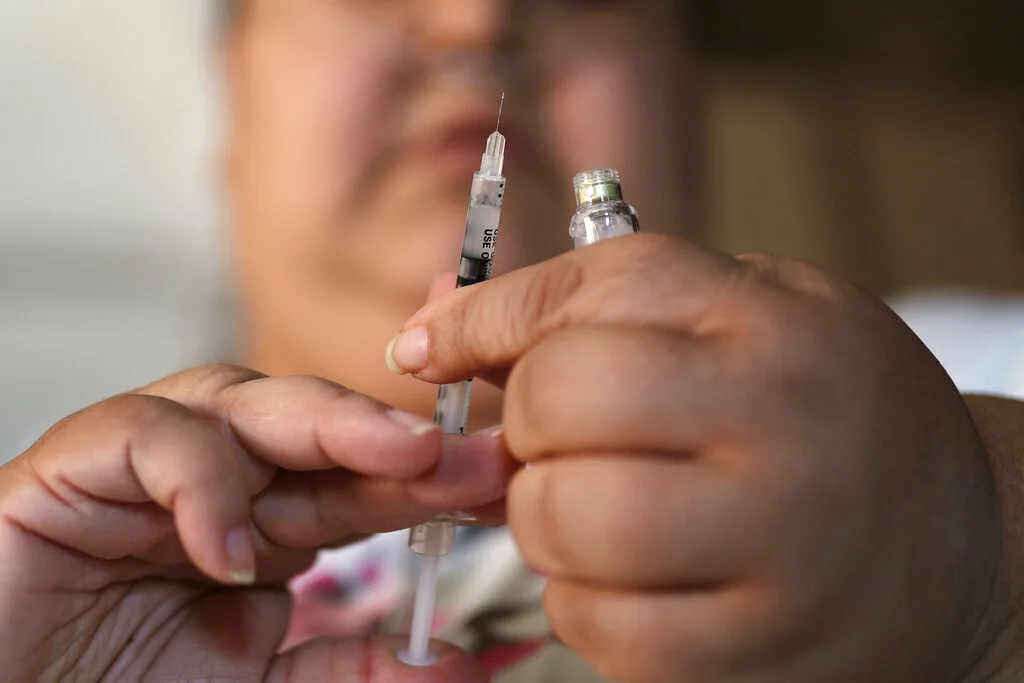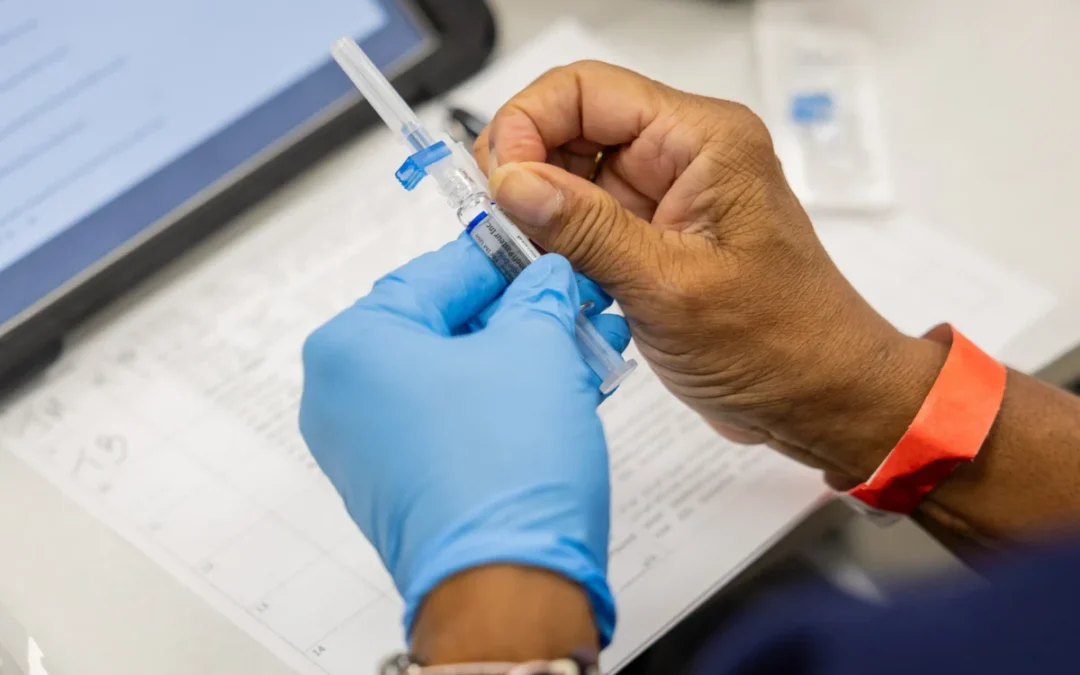
FILE - In this April 18, 2017 file photo, a woman with Type 2 diabetes prepares to inject herself with insulin at her home in Las Vegas. The skyrocketing price of insulin has some diabetics scrambling to cover the cost of the life-saving medication. Others are skipping doses or using smaller amounts than needed, and sometimes landing in the ER, patients and advocates told Congress in April 2019. (AP Photo/John Locher)
Nearly three years after it was signed into law, President Biden’s American Rescue Plan is still paying dividends, this time by prompting the nation’s three major insulin makers to drop their prices for the life-saving drug.
As of Jan. 1, Eli Lilly, Sanofi, and Novo Nordisk—which make up roughly 90% of the market—are all officially offering price caps and savings programs to lower the cost of some of their most widely-used insulin products to only $35 per month.
The price cuts are expected to benefit many of the roughly 8.4 million Americans, who need insulin to survive. In Michigan, 12.2% of the adult population has diagnosed diabetes, including hundreds of thousands of people who rely on insulin.
The changes have been widely viewed as a response to a provision of the American Rescue Plan that threatened to penalize the companies if they kept prices high. The 2021 law reformed the rules guiding the Medicaid health insurance program to remove a cap on the penalty drug companies pay for raising list prices above the rate of inflation.
That change led Eli Lilly to announce last March that it would lower the list price of its Humalog insulin by 70% to $66 per vial rather than pay potentially billions in penalties. The company also said it would implement a $35 monthly cap on out-of-pocket costs for its insulin products for people with private insurance, while the uninsured can use the Lilly Insulin Value Program savings card to get the medication for $35 a month.
Novo Nordisk and Sanofi quickly followed suit, announcing comparable price cuts two weeks later.
Sanofi has established a $35 monthly cap on out-of-pocket costs for Lantus, its most widely prescribed insulin in the US. The cap applies to those with commercial health insurance, as the company already limits the cost to $35 for all uninsured patients.
Sanofi has also cut the list price of Lantus by 78% to $96 for the prefilled pens and $64 for the 10-milliliter vial. The list price of its short-acting Apidra insulin has also been reduced by 70%.
Novo Nordisk, meanwhile, launched the MyInsulinRX program in September. The program offers a 30-day supply of insulin for $35 to eligible customers, including those without insurance. The company also has a copay savings card that allows eligible patients to buy its insulin products for between $35 and $99 per month, depending on their insurance.
The company has also lowered the list price of several of its insulin vials and prefilled pens, including NovoLog, Novolin, and Levemir by up to 75%.
Taken together, the company’s changes could provide much-needed relief to Americans struggling under the weight of insulin costs.
Although the medication is relatively inexpensive to produce, drugmakers have come under fire in recent years for continuing to raise the price of insulin. According to the American Diabetes Association, the inflation-adjusted cost of insulin has risen 24% from 2017 to 2022, and spending on insulin has tripled in the past 10 years.
About 1 in 4 diabetics who rely on insulin struggle to afford the medication, according to the association. Many American diabetics have been forced to ration their insulin as a result, and in some cases, this has led to death.
“For far too long, American families have been crushed by drug costs many times higher than what people in other countries are charged for the same prescriptions,” President Biden said last March when Eli Lilly announced they were lowering their prices. “Insulin costs less than $10 to make, but Americans are sometimes forced to pay over $300 for it. It’s flat wrong.”
While the company’s price cuts are in large part due to the American Rescue Plan, the Biden administration’s other efforts on insulin have also lowered costs for many diabetics.
Passed in 2022, the Inflation Reduction Act implemented a $35 monthly cap on insulin for Medicare recipients.
As a result, nearly 67,000 Michigan seniors on Medicare who use insulin are now charged no more than $35 per month for an insulin prescription.

A new car vs. health insurance? Average family job-based coverage hits $27K
By Phil Galewitz, KFF Health News With the federal shutdown entering its fourth week, spurred by a stalemate over the cost of health insurance for...

Fighting a health insurance denial? Here are 7 tips to help
By: Lauren Sausser When Sally Nix found out that her health insurance company wouldn’t pay for an expensive, doctor-recommended treatment to ease...

It’s almost flu season. Should you still get a shot, and will insurance cover it?
Madison Czopek, PolitiFact August 18, 2025 For parents of school-aged children, the fall to-do list can seem ever-growing. Buy school supplies. Fill...

Opinion: Health care is at risk as Grad PLUS loans face the chopping block
The ‘One Big, Beautiful Bill Act’ strips critical funding from medical students and threatens care in rural and underserved communities. We never...

Macomb County households will start losing money this year under Trump’s new spending law. Here’s how much—and who let it happen
Families in Michigan’s 10th Congressional District will shoulder over $500 million in lost funding, while billionaires cash in. In the neighborhoods...





